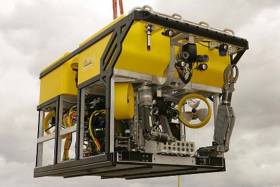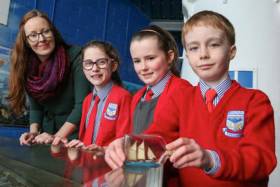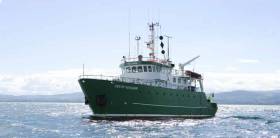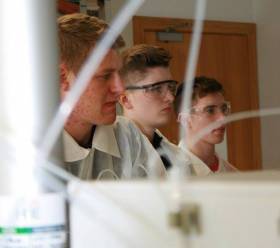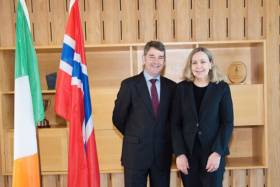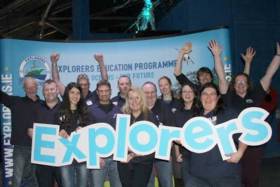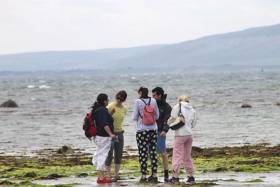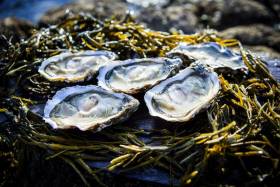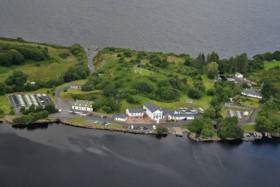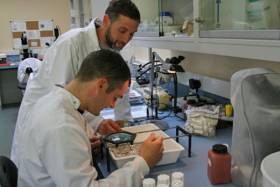Displaying items by tag: Marine Institute
Marine Institute Continues to Assist Rescue 116 Recovery
The Marine Institute is working closely with the Coast Guard, the Air Accident Investigation Unit, Commissioners of Irish Lights, Geological Survey Ireland, P&O Maritime Services, the Navy, An Garda Síochána, and local skippers.
The Marine Institute's ROV Holland 1 remotely operated vehicle was deployed from the Commissioners of Irish Lights vessel, the ILV Granuaile. The ROV has high definition cameras, powerful lighting, robotic arms, and has been fitted with other specialist equipment to assist with the operation. It was fitted with a 'ROV homer' provided by the National Oceanographic Centre Southampton, capable of receiving signals from a black box. During a dive on Wednesday 22nd March, the ROV located rescue helicopter R116 on the sea bed on the Eastern side of Black Rock, at a depth of approx. 40m. The ROV acquired extensive video footage of R116 until poor weather conditions required the ROV to halt operations.
Experienced surveyors from the national seabed mapping programme, INFOMAR – a joint Marine Institute, Geological Survey initiative - continue to assist with the operation. The INFOMAR team identified target points for investigation and created 3D and 2D images of the seabed in the search area to help direct the ROV and assist with planning and safety of diver operations.
The Marine Institute will continue to cooperate with the Air Accident Investigation Unit, the Coast Guard, An Garda Síochána, and local persons and agencies to recover the missing crew members.
#MarineScience - Fourth-class pupils from Cregmore National School in Co Galway are creating a marine science and art installation and short film with artist Louise Manifold that re-enacts the 2011 discovery of the Moytirra deep-sea hydrothermal vents.
Build Your Own Unknown sees the school children use images and footage from the ROV Holland I for inspiration to recreate the discovery of the gigantic rock formations, ‘smoking’ lava vents over 10m high, and areas teeming with unusual species new to science at the Moytirra vent field in the Mid-Atlantic Ridge, some 3km below the surface north of the Azores.
Louise Manifold, the local artist leading the project, said: "As an artist I have always been fascinated by relationship between science and cinema, where often our connections to ocean is formed through our childhood imagination, from sci-fi films to childhood games and mythical stories.
“Build Your Own Unknown is not only about understanding our connections to the ocean, but it is about valuing human curiosity, and I am really enjoying the opportunity to work with the pupils of Cregmore to make an amazing piece of work that celebrates this."
Supported through the Marine Institute's Explorers Education Programme and the Tulca OFFshore programme, the marine science/art collaboration is welcomed by Marine Institute chief executive Dr Peter Heffernan.
"This is an innovative opportunity for artists, marine scientists and educators to engage and increase our awareness about the value, opportunities and societal benefits that the ocean provides us,” he said.
"Rediscovering the mystery of the ocean through the eyes of a scientist, the children have been given the opportunity to work with the Institute and Dr Andy Wheeler from UCC, who was the chief scientist on the research vessel RV Celtic Explorer, that had explored and aptly named Moytirra vents after a mythological Irish battlefield meaning plain of pillars.”
Build Your Own Unknown will be on show at SeaFest 2017, Ireland’s national maritime festival from 30 June to 2 July, which will promote the importance of ocean exploration as well as engage the wider community through visual arts.
The project will also include the development of cross-curricular education lesson plans and resources that teachers will be able to use for their own art-science project module. These will be available later this year at www.explorers.ie.
Marine Science Vessel RV Celtic Voyager Joins Search for Missing Coastguard Helicopter R116
The Marine Institute ship RV Celtic Voyager is providing specialist support to assist in a major sea search off the county Mayo coast approximately six miles west of Blacksod to locate an Irish Coast Guard helicopter believed to have entered the sea at approximately 1am on Tuesday 14th March.
The Dublin based search and rescue helicopter R116 had been providing 'top cover' during a medical evacuation of a crewman from a UK registered fishing vessel approximately 150 miles west of Eagle Island in County Mayo, which was completed by Sligo based Coast Guard helicopter R118.
The RV Celtic Voyager is assisting with the search operation this morning approximately six miles west of Balcksod. Marine Institute staff from the INFOMAR team, (the national seabed mapping programme) are assisting with the search using specialist multibeam sonar equipment onboard the national research vessel, RV Celtic Voyager.
The search operation is being coordinated by the Coast Guard Rescue Coordination Centre in Malin Head. The RV Celtic Voyager was diverted yesterday from an undergraduate training survey with GMIT, to assist with the search following a request by the Air Accident Investigation Unit of the Department of Transport. Coast Guard search and rescue helicopters, the Air Corps, Navy, RNLI and a number of local fishing vessels are involved in the search operation.
#MarineScience - Over 20 Transition Year students participated in a wide range of activities at the Marine Institute as part of Engineering Week this past week from Monday 27 February to Friday 3 March.
For the third annual TY training week at the Marine Institute headquarters in Oranmore, the fourth-year pupils from Mayo, Galway, Kerry, Cork and Tralee increased their understanding of and interest in marine science, research engineering and technology careers.
Scientists and staff from the State agency responsible for marine research and innovation welcomed the opportunity to share their passion and insights across a wide range of areas in the marine science and maritime sectors.
Ireland's marine sector is a vibrant part of our national economy and the need for education in the marine sector at all levels is highlighted by Ireland's Integrated Marine Plan, Harnessing Our Ocean Wealth, according to Marine Institute chief executive Dr Peter Heffernan.
“Increasing the student's knowledge and engagement with marine careers in science, technology and innovation, as well as the sustainable development and management of our marine resource, is key to support Ireland's ocean economy, where highly qualified and skilled professionals are needed in the coming years,” he added.
The annual TY training course offers students an intensive week of shadowing scientists and staff learning about marine science, technology and engineering as well as a range of diverse supporting disciplines.
Promoting ocean literacy, the students took part in interactive experiments involving IT applications, marine environment and food safety, fisheries sciences, research vessel operations as well as advanced mapping, maritime development and communications.
The students found themselves working with hairdryers, balls and vinegar learning about data collection to how human industrial activities affect the increased levels of carbon dioxide in the ocean.
Interactive activities included dressing up in wet gear, forming sand sculptures of shipwrecks and working on group poster presentations provided learning opportunities that extended their skills and interests as well as raising their awareness about the ocean.
“With the training week fully booked out, we were delighted to see the increased levels of interest and understanding of the marine and the direct benefits of the communications and team building training that form an essential part of this rounded programme,” said Marine Institute HR manager Catherine Quigley-Johnston.
The programme aims to ensure a diverse and well-educated generation of marine scientists and researchers for the future, she added.
“The feedback from students confirms the need for industry and third level institutes, as well as State agencies to promote training and access for young people in marine and maritime careers.
“The training programme also highlights the effort and willingness of the Institute's staff to share their areas of expertise with the younger generations. This is what helps makes TY open days and training weeks so successful,” said Quigley-Johnston.
Marine Institute Hosts Norwegian Ambassador’s Galway Visit
#Research - A recent visit to the Marine Institute by the Norwegian Ambassador to Ireland Else Berit Eikeland was an opportunity to discuss marine research collaborations with a North Atlantic partner.
That’s according to Marine Institute chief executive Dr Peter Heffernan, who added: "The essential role of international cooperation in developing our knowledge of the Atlantic and North Atlantic Ocean and its dynamic systems is necessary, particularly in a time when we need to adapt to climate and environmental changes taking place around the world.
"Aligning our research efforts in areas such as fisheries ecosystem management; marine environment and food safety in aquaculture and shellfish; as well as oceanographic digital research, provides us with future partnerships that can benefit and improve ocean health and stewardship as well as promote the sustainable management of our ocean resources.”
The Marine Institute hosted the visit of Her Excellency Else Berit Eikeland, Ambassador of the Royal Norwegian Embassy to Galway, where she met executive management at its headquarters in Rinville, Oranmore last Thursday 23 February.
15,000 School Children to Benefit from Marine Education Programme in 2017
The Marine Institute's has announced that over five hundred teachers and 15,000 primary school children will benefit from its Explorers Education Programme this year. Recent expansion in funding has enabled outreach centres in ten counties around Ireland, to triple the number of teachers and children being introduced to marine themes in the classroom.
Providing the opportunity to learn about the importance of engaging with the sea, and strengthening our marine heritage and identity, the Explorer education officers introduce marine biodiversity and marine environmental awareness and care into the class room through a range of exciting STEM marine based modules including aquariums in the class, seashore safaris, as well as marine projects and workshops.
Dr Peter Heffernan, CEO of the Marine Institute congratulated the new centres on a successful delivery of the Explorers Programme in the last six months saying "increasing our awareness and understanding of the value, opportunities and societal benefits the ocean provides us is key to sustainably developing Ireland's marine resource which is ten times the size of its land mass."
As the state agency responsible for marine research and innovation "we welcome the opportunity to work with educators to promote the development on our thriving marine economy as well as protecting and conserving our rich marine biodiversity," Dr Heffernan further said.
The need for education in the marine sector at all levels is highlighted by Ireland's Integrated Marine Plan Harnessing Our Ocean Wealth noting Ireland's marine sector is a vibrant part of our national economy. Ireland's Ocean Economy SEMRU, NUI Galway report states that Ireland's marine economy in fisheries and seafood production, maritime transport, marine tourism, as well as in emerging sectors and research and development has a turnover of €4.5 Billion annually, providing over 16,000 jobs directly and 13,000 related jobs in the general economy, providing an additional €3.3 Billion in turnover annually.
The centres representing the Explorers Education Programme™ were selected as part of a national procurement process and include Leave No Trace, Redrose Developments, Galway Atlantaquaria, Loophead Summerhedge School, Seasynergy Marine Awareness and Activity centre, Lifetime Lab, Oceanics Surf School and Marine Education Centre and SeaLife Bray. The centres are located in Sligo, Donegal, Mayo, Galway, Clare, Kerry, Cork, Waterford, Wicklow and Dublin. Free lesson plans, teachers resources and more information about the Explorers Education Programme™ is available at www.explorers.ie
The Explorers Education Programme is supported by the Marine Institute, and funded under the Marine Research Programme by the Irish Government.
New Marine-Themed CPD Course For Primary Teachers In Galway
#MarineScience - The Explorers Education Programme has recently launched a free continuous professional development (CPD) course for primary school teachers in the West of Ireland, which can be carried out during Croke Park hours.
The new CPD course provides an "exciting opportunity for teachers to develop interesting ways of introducing cross-curricular ocean themes into their school planning, class activities as well as seashore fieldwork,” said Dr Noirin Burke, education director at Galway Atlantaquaria.
The course uses a number of key education methodologies, including inquiry-based learning and fieldwork planning, that links to the national curriculum. The course is flexible in which it can be carried out at Galway Atlantaquaria, Salthill Promenade, Galway or at the school.
Dr Peter Heffernan, chief executive of the Marine Institute – which funds the Explorers progamme – congratulated Galway Atlantaquaria for delivering the CPD course in Galway.
"We welcome the opportunity to support educators and teachers through the Explorers Education Programme recognising the importance of our personal connection with the ocean.
“The ocean has a significant impact on our wellbeing, health and economy and it is great to see this being picked up in the classroom."
To book a place or for more information, email the Explorers education team at Galway Atlantaquaria at [email protected] or call 091 585 100.
Marine Institute Recruiting Temporary Laboratory Analyst For Foodborne Viruses In Shellfish
#Jobs - The Marine Institute requires a laboratory analyst to provide support to a two-year research project investigating norovirus, hepatitis A virus, hepatitis E virus and sapovirus concentrations in oysters.
The work will primarily involve laboratory based detection of the viruses in oysters using existing and proposed molecular procedures. In addition, there may be some elements of field work including sampling and environmental monitoring.
This temporary specified-purpose contract of employment is funded under the FIRM programme and will run for a duration of up to two years. The successful candidate will be on probation for the first six months.
To apply, a CV and letter of application summarising experience and skill set applicable to the position should be emailed to [email protected] or posted to Human Resources at the Marine Institute, Rinville, Oranmore, Galway. All correspondence for this post should quote reference LA-FIRM-Jan 2017
All applications for this post should be received by the Marine Institute before noon next Tuesday 7 February. Late applications will not be accepted.
A detailed job description is available from the Marine Institute website HERE.
Taoiseach Announces €6M Investment & 20 New Jobs At Co Mayo Marine Research Facility
#MarineScience - Taoiseach Enda Kenny today (Saturday 28 January) announced the creation of 20 new jobs and a €6 million investment in the Marine Institute's facility in Newport, Co Mayo.
The 20 new positions will be based at Newport research facility where they will be engaged in a number of projects funded from a secured pot of €6 million in research grants from a number of agencies including the Science Foundation Ireland, Interreg, EU H2020/European Research Council, European Maritime and Fisheries Fund (EMFF) and the British Research Council.
Speaking in Furnace, near Newport, the Taoiseach — who is also TD for Mayo — said the move “is very timely following the launch of Realising our Rural Potential – the Action Plan for Rural Development earlier this week.
“The Newport facility is a real example of innovation taking place in a rural community and creates exciting opportunities both now and in the years ahead.
“Scientists at doctoral and post-doctoral level working at the facility are involved in conducting research with not only national implications, but also international relevance. In other words, it firmly brings what is a rural area into a national and international context.”
The Taoiseach added: “This is a relatively unique research facility in operation since 1955 and I am delighted to see the continued excellent quality research that is taking place following €6 million in funding from research grants.
“I also wish to thank the Marine Institute and their educational partners for their efforts in building a strong international reputation for marine research and innovation."
The Marine Institute says a range of cutting edge research is carried out at its Newport facility including genetics work across several species of salmon, sea bass and pollock, research on the catchment, and climate change.
The facility is attracting multiple Irish Higher Education Institutions and international partners including University College Cork, Queens University, University College Dublin, GMIT, Dundalk Institute of Technology, NUI Galway and the University of Glasgow.
In addition, the Marine Institute is working with Mayo County Council to actively develop new initiatives at the facility to further enhance what the Marine Institute can offer and benefit the local area.
Supporting the announcement, Marine Minister Michael Creed said that his department and the fishing industry consider pollock “a very important commercial species for some elements of the Irish fleet. It is good to see a new project on this species being carried out in Newport, using the scientific expertise that is there."
Marine Institute chief executive Dr Peter Heffernan added: "Ireland has been gaining a reputation in Europe, and internationally for its marine research and innovation, and for driving collaboration in this area. We have a strong marine research community supported by growing national research infrastructure.
“This €6 million investment programme will see the Marine Institute expand its research capacity at its Newport facility and the continued investment in marine research will ensure that Ireland stays at the cutting edge of research and innovation."
In his own welcoming statement, Mayo county manager Peter Hynes said: "This is fantastic news for Mayo and the West region and Mayo County Council looks forward to continuing to work with the Marine Institute to further develop this cutting edge research facility here in Newport."
#MarineScience - The Marine Institute is inviting students to apply for a number of work placement bursaries in many exciting areas for the summer of 2017.
The Marine Institute Bursary Scholarship Scheme is worth €275 per week for an eight- to 12-week placement, bursary dependant. Placements will be based in various locations including the Marine Institute at Oranmore, Co Galway; Newport, Co Mayo; and other locations and ports around the country.
The Marine Institute's Bursary Scholarship Scheme provides valuable practical experience for marine science students in areas of research such as marine fisheries, salmon management, aquaculture, the Fish Health Unit, oceanography instrumentation, benthic ecology, communications and R&D.
Last summer’s programme saw 28 students from across Ireland embark on work placements in a variety of areas including salmon and shellfish assessments, fish sampling at ports, maritime economics and even app development.
The programme is aimed at undergraduates of universities, institutes of technology and national institutes for higher education. The scheme is strictly limited to undergraduates who will have completed two years study in a relevant discipline by the beginning of June.
Previous bursars have gone on to work in the Marine Institute (including two directors of the institute), BIM, Regional Fisheries Boards, county councils, pharmaceutical companies and State laboratories, with some going as far afield as the EPA in Sydney, Australia, and others now running their own companies.
To apply for the Summer Bursary Programme, check out the bursary titles on offer, and select the two bursaries that interest you most in order of preference. Then complete the application form and return it FAO Annette Jordan, Marine Institute, Furnace, Newport, Co Mayo by the deadline of Friday 10 February.


























